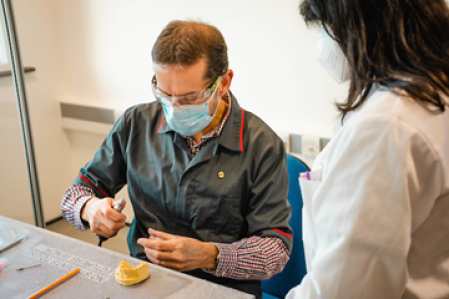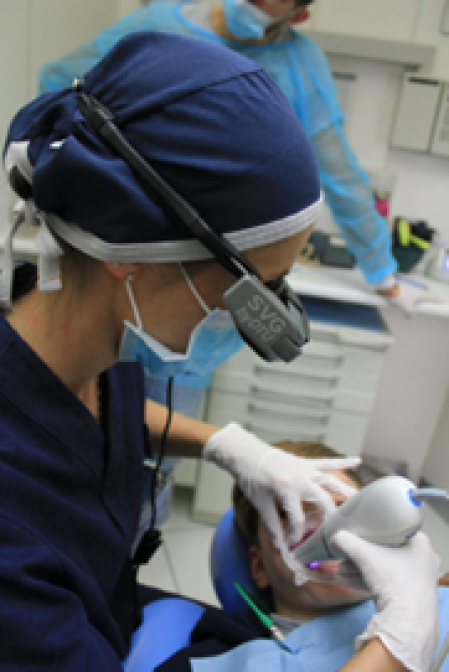
University of Bolton, Deane Road, Bolton. BL3 5AB
Tel:
Email:


“At the University of Bolton, we take great pride in providing a quality, supportive learning environment for our students.”
Professor George E Holmes DL | President & Vice Chancellor
“...tutors are very supportive and you’re not just a student ID number, at this university you are an individual with a name.”
Ellisse Vernon | BSc (Hons) Adult Nursing
Back to menu
Back to menu
Study with an Off-Campus Partner
Back to menu
Back to menu
University of Bolton, why we are the right choice
Location - Bolton, Greater Manchester

29/11/2022
Regenerative medicine refers to one of the most exciting new developments in the ever-evolving dentistry field. There are constantly new technologies and techniques being developed to improve the ways in which patient care is being administered. But what is regenerative medicine? Essentially, it refers to the way we treat oral health conditions.

This blog explores the new advances in regenerative medicine in more detail, and also how an MSc Digital Dental Technology degree can help graduates get ahead in the advancing dentistry sector.
What is Regenerative Medicine?
Now, we’ve already touched on this briefly, but let’s explore it more in-depth. Essentially, this refers to how dentists can repair or replace damaged tissues of organs. Dental technology graduates may already be aware that teeth are the only parts of the human body that can’t repair itself, so this concept could be deemed revolutionary in the industry. It includes the use of stem cells, which are specialised cells that can transform into different types of cells. In dentistry, regenerative techniques are constantly being developed to repair any damage caused by decay, wear, and trauma.
The future aim of regenerative medicine is that one day, dentists will be able to use these techniques to restore teeth back to their original strength and condition, eradicating the need for fillings and other invasive treatments.
This leads us into the next section of the blog... the two main approaches to regenerative dentistry: tissue engineering and cell therapy.
Tissue Engineering
You might be wondering what tissue engineering is? It uses stem cells to create living tissue that can be used to replace any damaged tissue. To do this, the stem cells are first grown in a laboratory until they form what is called a ‘tissue construct’. This is then implanted into the patient, where it continues to grow and develop into health tissue.
Tissue engineering bypasses the need to harvest stem cells from the patient's own body. Instead, it means that there is less risk of rejection by the patient’s immune system, as well as reducing the risk of infection.

Cell Therapy
Cell therapy aims to introduce new, healthy cells into a patient’s body to replace the damaged or missing ones. Probably the main challenge for this is having enough cells to complete the transplantation into a patient. This is because the approach involves using stem cells that have been harvested from the patient’s body to repair the damaged tissue. The cells are usually taken from another part of the patient’s body, for example their bone marrow, and then they are injected into the damaged tissue.
Despite, the challenges of cell therapy, there are also positives. The main one being that it’s proved effective in repairing damaged tissue, and the fact that it uses the patient’s own cells means that there is no risk of rejection by the immune system.
MSc Digital Dental Technology Course Highlights
If you’re a dentistry or dental technology graduate looking to build on your employability skills with a master’s degree, the University of Bolton’s MSc Digital Dental Technology degree can help you.
Let’s look at some of the course highlights:
- We are one of only four UK universities who offer a dental technology degree
- You will get to study in our £4.8 million Centre for Dental Sciences; with access to our industry-standard specialist equipment and advanced biomaterials in our purpose-built laboratories
- Students benefit from studying in our on-site practice clinic
- We offer regular hands-on sessions to help develop your practical capabilities, preparing you to work independently on your dental appliance manufacturing, and research-based project
- Direct support from our dedicated lecturers, who have an extensive amount of professional experience, industry knowledge, and technical expertise
- You will benefit from our strong industry links with dental organisations across the UK, offering opportunities for industry masterclasses and lectures, joint projects and networking
It’s no secret that regenerative medicine represents a breakthrough in dentistry, with potential implications for the treatment of many oral health conditions. If you’re interested in strengthening your knowledge of such a revolutionary part of an essential life sector, then an MSc Digital Dental Technology degree at the University of Bolton would be a great idea.
Click here to see our full course details. If you wish to speak to a member of our team, please don’t hesitate to contact us at enquiries@bolton.ac.uk or call on 01204 903807.